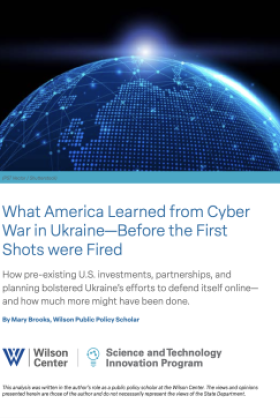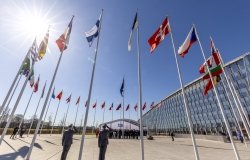Remarks by Blair A. Ruble, Director, Kennan Institute at the 25th Anniversary Dinner held on October 4, 1999.
I was taken aback recently while reading the latest pot boiler by popular detective story writer Polina Dashkova entitled The Easy Path to Insanity, in which a certain Sergei is trying to figure out what happened to one Lena. Sergei goes to Lenas apartment to look for clues about her fate. He breaks into her mail box and finds several advertising brochures, and a thick envelope with foreign stamps and lettering. He mouths the English Miss Elena Polianskaia, Moscow, Russia, and looks at the return address. It's from the Kennan Institute.
We are gathered here this evening to celebrate the anniversary of an American institution which even makes its ways into the pages of what is called a Ruskii bestseller. How did that institute begin?
The Kennan Institute emerged from a remarkable conference convened by George Frost Kennan at Princeton in the early 1970s to consider how to revitalize Russian and Soviet studies in the United States. Among a number of ideas to emerge from that gathering was a recommendation that a national Russian studies center be established in Washington, D.C., which would not be tied to any single university, but would serve all universities. We are here this evening to honor George Frost Kennan's vision in founding that institute, which was named after his ancestor, the nineteenth century explorer George Kennan.
George Frost Kennan's vision would not have been realized were it not for James Billington, who, as newly named director of the Woodrow Wilson Center, worked with the Chairman of the Center's Board William Baroody, Sr., as well as with Princeton historian S. Frederick Starr, to launch the institute. Professors Kennan, Billington, and Starr set out three goals for the new institute:
to promote quality research on Russia and its adjacent lands;
to foster a creative dialogue between American academic and government specialists on the region; and to integrate the American and international Russian studies.
Over the past twenty-five years, the Institute has supported the work of over 1,100 scholars, has organized over one hundred major conferences bringing together academic and government, U.S. and international specialists (plus literally thousands of smaller meetings), and has promoted a genuinely international conversation about Russia.
To provide a better idea of the extent to which the Kennan Institute has nurtured international discussions about Russia, some 20% of all the scholars to have passed through the Institute since 1974 have come from the region, nearly all during the past decade. Indeed, just a few hours ago when evening was turning into night in Moscow, over 70 Russians -- including cosmonaut Iurii Baturyn, human rights activist Davlat Khudonazarov, sociologists Igor Kon and Natalia Rimashevskaya, political observers Lilia Shevtsova and Olga Krishtanovskaia, and many more -- gathered at the Architect's Club in downtown Moscow to have their own celebration of our 25th anniversary.
If the Kennan Institute has succeeded in the mission set for it by Professors Kennan, Billington, and Starr, it has been because of the remarkable people who have tried to implement their dream. We have with us this evening all of the Institute's directors, and I would like to acknowledge their role in bringing about our success.
As I have already mentioned, the task of launching the Institute fell to S. Frederick Starr. Fred very quickly established the Institute's reputation both within Washington and well beyond the Beltway. So much of what the Kennan Institute is now known for -- the Monday Noon Discussion, the Short Term Grant Program, our Occasional Paper Series, our library -- dates back to Fred's initial directorship. Converting a new institution into a self-standing establishment following the term of a charismatic founder is no easy task. That unenviable assignment fell to Abbott Tom Gleason, whose success insured that the Kennan Institute would have a long life.
Fred and Tom, both being historians, gave pride of place to the humanities in their programming. Their successor, literature specialist John Glad, focused attention on Russian letters in the life of the Soviet Union at large, and in the Kennan Institute more particularly. John was followed by Herb Ellison, who is still with us as the present chair of our Advisory Council. Herb brought about two fundamental changes in the Institute. He secured Title VIII funding, which permitted the Institute to launch its Research Scholars Program for young American scholars, and he launched the Kennan Institute endowment, the George F. Kennan Fund, which is approaching $8 million in value.
Herb's successor and my predecessor, Peter Reddaway, similarly presided over a remarkable time at the Institute. Peter had the difficult task of shepherding a Washington Soviet Studies program through the Gorbachev perestroika years. Peter was responsible for opening up our various competitions to scholars from the Soviet Union (the full wisdom of which has been revealed following his departure).
As accomplished as these directors have been, they could not have begun to achieve so much were it not for the exceptional people who have worked with them. Principal among our collaborators have been the members of the Institute's Advisory Council. There also have been 63 employees of the Kennan Institute over the past quarter-century. This is a very diverse group, with a variety of individual strengths. They share one characteristic, which, I am confident, my predecessors and I value more than any other: they all, together and individually, make the Kennan Institute's directors appear to be better than we really are.
At the end of the day, the Institute has been first and foremost about the 1,100 scholars who have conducted their research, written their articles and books, and spoken with their colleagues in the Wilson Center and in Washington at large. These researchers literally come from every corner of our planet, from nearly every state within the U.S., and from all the countries of the region. It is about them, and their work, that those who gathered in Princeton so long ago were concerned; and it is they who, more than anyone else, have confirmed the wisdom of George Kennan's vision for our institute.
In closing, as we look to the future, we must not forget the past. We especially must not forget the great contributions of Russian minds to the world's understanding of the human condition. This last thought sadly reminds us that Russia lost one of those great contributors to universal wisdom and moral contemplation just a few days ago with the death of Dmitry Sergeeyvich Likhachev.
I suspect that everyone in this room agrees that we in the United States can not simply forget about what is taking place in Russia. Russia finds ways to shape how we Americans live our own lives, even when we prefer to look the other way. As George Frost Kennan, and George Kennan the Elder before him, have argued so forcefully over the past several decades, we cannot afford to ignore Russia.
George Kennan the Elder ended the preface to his monumental Siberia and the Exile System a century ago with a thought that very much reflects the attitudes of many who have worked in the Institute which has been named in his honor. Kennan wrote, "... If, by a temperate and well-considered statement of the results of my ... investigations, I can make the country and the nation better known to the world... I shall be more than repaid..." The Kennan Institute has spent the past quarter century trying to present temperate and well-considered statements of the results of our work. We will seek to do so in the years and decades ahead in the hope of making Russia the country and nation better understood to the world at large, and to Americans in particular.
Thank you.
Related Program

Kennan Institute
The Kennan Institute is the premier US center for advanced research on Russia and Eurasia and the oldest and largest regional program at the Woodrow Wilson International Center for Scholars. The Kennan Institute is committed to improving American understanding of Russia, Ukraine, Central Asia, the Caucasus, and the surrounding region though research and exchange. Read more










